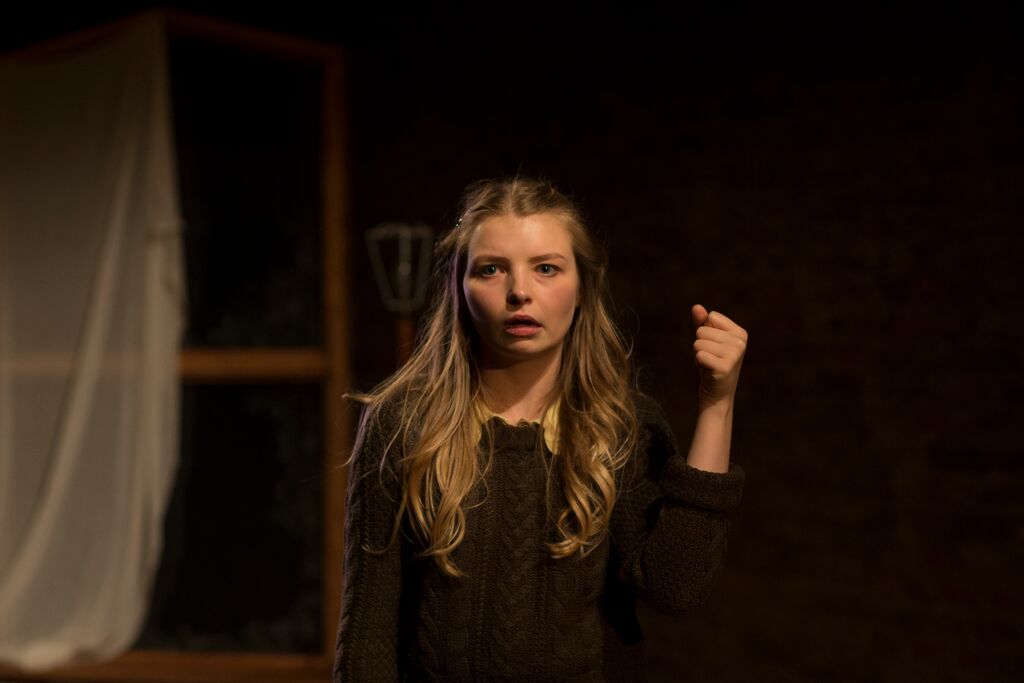
Of all the chores on her grandfather's farm, Madeleine particularly loves crushing cans. She especially enjoys those cans that put up a bit of resistance right at the end, admiring how they fight the inevitable. Her satisfaction in dispatching cans contrasts with those times when she must hold the flashlight while her brother and grandfather feed the cows: at these times, she knows that her task is essentially a ploy to keep her from feeling useless, an insight that speaks to her relative isolation in Genevieve Hulme-Beaman's Pondling, part of New York City's annual 1st Irish Festival.
Of course, it is likely that Madeleine, played by Hulme-Beaman herself, is not actually our protagonist's name. She likes to introduce herself as Madeleine Humbel Buttercup, pronounced with a French accent, one part of her campaign of self-fashioning. Her age is similarly indeterminate: there is a reference to training wheels and the 14 year-old object of her affections plays the role of an “older man.” What we do know for sure is that she is waging her own, largely internal, fight against what is likely inevitable: a common, anonymous farm life. Madeleine returns again and again to ideas and ideals of courage, glamour, and beauty, not entirely unlike a child version of Hedda Gabler. She has no parents (and so no women in her immediate life) and exists mostly on the periphery of her grandfather and brother’s world, emblematized by the former’s off-limits study, where the men talk about killing animals and she sneaks at night to watch videotapes. Her grandfather is fond of quoting Yeats's "The Lake Isle of Innisfree," a poem whose longing for rural isolation directly opposes Madeleine’s desire to be, say, a dramatic Parisian lover; the fact that he (ab)uses the poem’s opening lines to simply indicate that mealtime has ended and he is off to feed the cows further underscores the unsophisticated world that Madeleine chafes at. While she wants nothing more than to be a beautiful French swan girl, as she puts it, she primarily ends up telling her secrets to the family chickens.
Although Madeline does derive palpable enjoyment from little things like making the hot barley porridge that guarantees her the chickens' friendship, she also intensely yearns to be seen, recognized, accepted, and loved -- by her crush, by substitute maternal figures, even by the town more broadly. This yearning sometimes makes her use others -- the chickens, a girl she meets in a park--to achieve her ends. Underneath the poised, fashionable surface that she wants to project, the audience catches glimpses of loneliness and even rage. Madeleine desires to be the buttercup, part of her french alias, but she is also linked by the play to the poisonous tansey ragwort, a flower whose designation as a beautiful yellow killer creates an association with the blond, yellow-skirted protagonist. Pondling does not shy away from the casual violence of which children are capable, whether in a darkly absurd act of revenge or to prove to a new friend that she is right about a "farm fact."
Hulme-Beaman, alone onstage with a curtained window frame, some travel cases, and a table, most of which end up pulling other duties as things like stairs and can crushers, creates a unique, fully-realized voice and individual consciousness for her unreliable narrator. She magnificently captures the intensity of a child’s emotions and experiences, from abrupt swings in mood, to slightly inelegant gestures meant to show grace, to her restless, expressive hands, and there are many moments of what would be accidental humor coming from a child. Overwrought, troubled, and still awkwardly sympathetic, Madeleine is in some ways reminiscent of Francie Brady of Patrick McCabe's Frank Pig Says Hello/The Butcher Boy, and her romanticizing impulse, undercut by unwelcome reality, echoes works from Joyce's Ulysses to Synge's Playboy of the Western World. Pondling's waters, however, are unquestionably its own. - Leah Richards and John Ziegler
